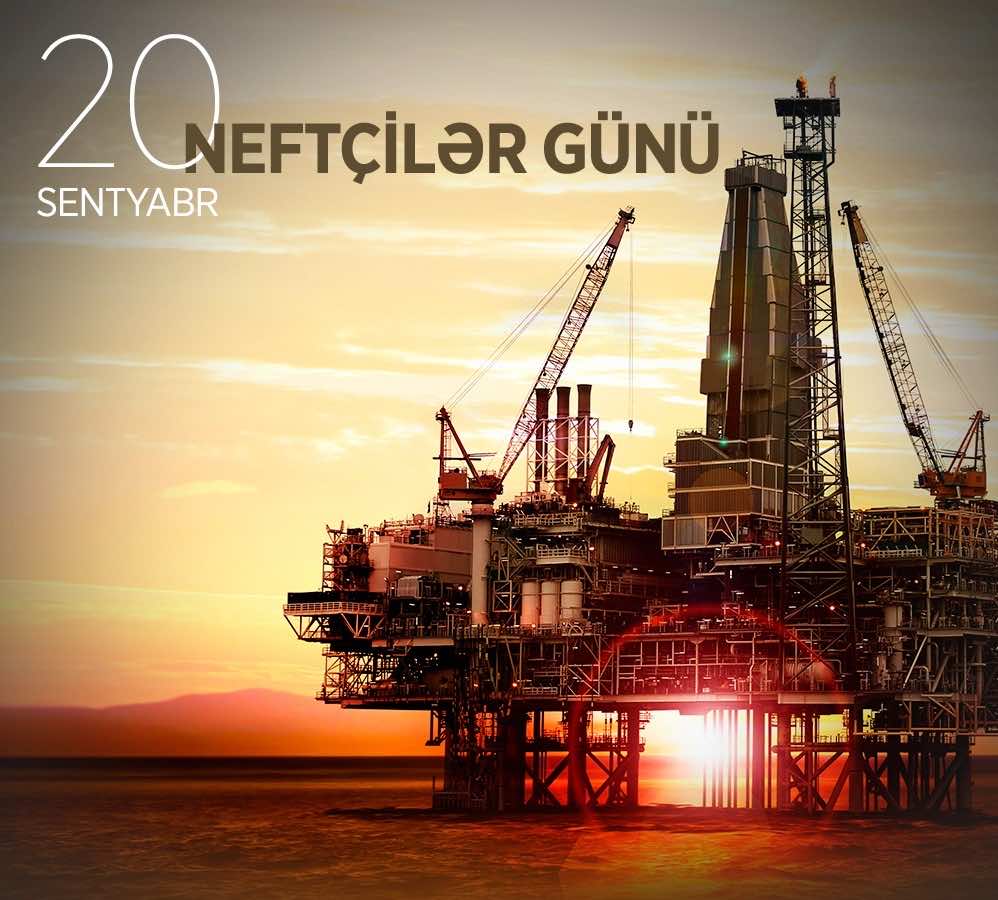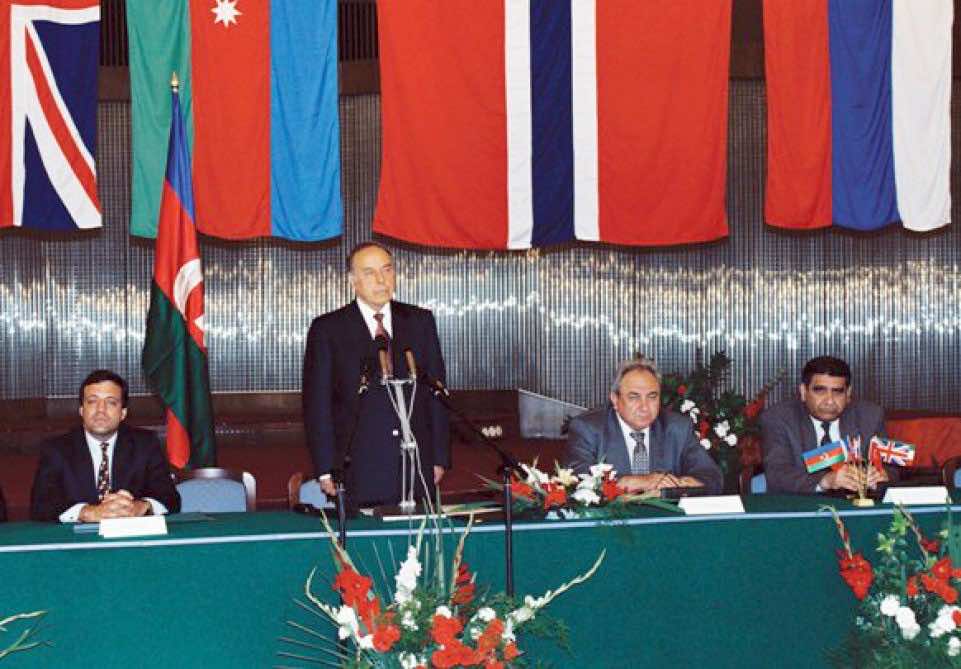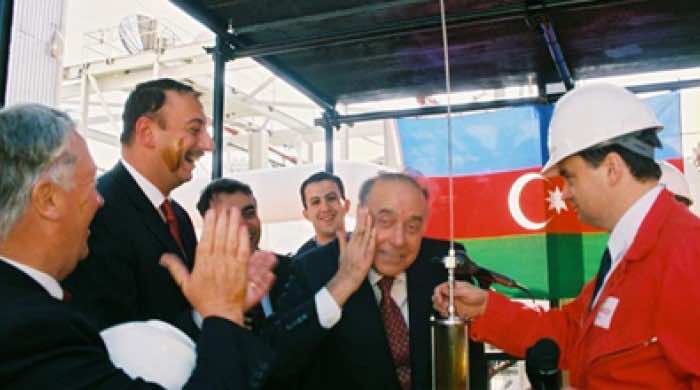Oilman's Day
 On September 20, 1994, an agreement was signed between the State Oil Company SOCAR and the world's leading oil companies "On the joint development of the Azeri", "Chirag" fields and the deep-water part of the Guneshli field in the Azerbaijani sector of the Caspian Sea and the share distribution of oil production. According to the decree of the National Leader Heydar Aliyev dated August 16, 2001, the date of signing the agreement - September 20, is celebrated in our country as the Oilman's Day.
On September 20, 1994, an agreement was signed between the State Oil Company SOCAR and the world's leading oil companies "On the joint development of the Azeri", "Chirag" fields and the deep-water part of the Guneshli field in the Azerbaijani sector of the Caspian Sea and the share distribution of oil production. According to the decree of the National Leader Heydar Aliyev dated August 16, 2001, the date of signing the agreement - September 20, is celebrated in our country as the Oilman's Day.
Azerbaijan, which has rich oil and gas resources, is known throughout the world as the "Oil Land", the "Land of Fire". In 1848, in Baku, an oil gusher that hit from a borehole at the Bibiheybat field laid the foundation for the industrial extraction of "black gold" in Azerbaijan. Transportation of oil through the pipeline was also implemented for the first time in Azerbaijan. The commissioning of the Baku-Batumi railway in 1883 and the Baku-Batumi oil pipeline in 1907 created conditions for the export of Azerbaijani oil to world markets. At that time, half of the oil produced in the world came from our country.
In the 20th century, the oil industry of Azerbaijan developed rapidly, strong production bases and scientific centers were created. During the Second World War, 75% of the oil produced in the Soviet Union came from Azerbaijan. The republic provided the front with fuel, and thus played a big role in the victory over fascism.
The powerful scientific and technological potential of Azerbaijan played an important role in the discovery of new oil fields in all corners of the former Soviet Union. It is no coincidence that oil fields discovered in various regions of Russia were called “the second Baku”, “the third Baku”.
One of the major achievements of our country is the discovery and development of offshore oil and gas fields. In 1949, 100 km from the shore, in the Oil Rocks field, unique for that time, for the first time in world practice, oil began to be produced on the high seas.
The years 1970-1980, the first period of leadership of the National Leader Heydar Aliyev in Azerbaijan, were characterized by the development of deeper sections of the sea by Azerbaijani oilmen. As a result of purposeful measures taken during this period, the oil industry became stronger - its extensive infrastructure was created. Drilling rigs were brought here to develop offshore fields in Azerbaijan, special vessels, machinery and equipment were brought here to ensure construction work at sea, and a deep-water base plant was built in Baku. At the same time, there was a big leap in the development of the oil refining, petrochemical industry and petroleum engineering. Azerbaijan became one of the leading republics of the former Soviet Union.
 After the restoration of independence, all sectors in our country were in a state of crisis. The oil industry was also paralyzed. The people saw in Heydar Aliyev the only way to salvation. National Leader Heydar Aliyev, who again returned to power in 1993 at the insistence of the people, began unprecedented construction in the country, carried out fundamental reforms in a short time and presented Azerbaijan as a democratic and stable country in the international world, skillfully used the oil factor and developed a step-by-step strategy calculated for the coming decades. The basis of Azerbaijan's oil strategy was laid by the signing of the "Contract of the Century" on September 20, 1994. For the first time in the Caspian Sea, together with many companies of the world, the exploitation of oil and gas fields began. In an extremely short time, the first Chirag-1 production platform was put into operation, the Baku-Novorossiysk oil pipeline was restored, a new Baku-Supsa oil pipeline was built, such grandiose drilling rigs as “Dede Gorgud”, “Istiglal”, “Gurtulush” were put into operation.
After the restoration of independence, all sectors in our country were in a state of crisis. The oil industry was also paralyzed. The people saw in Heydar Aliyev the only way to salvation. National Leader Heydar Aliyev, who again returned to power in 1993 at the insistence of the people, began unprecedented construction in the country, carried out fundamental reforms in a short time and presented Azerbaijan as a democratic and stable country in the international world, skillfully used the oil factor and developed a step-by-step strategy calculated for the coming decades. The basis of Azerbaijan's oil strategy was laid by the signing of the "Contract of the Century" on September 20, 1994. For the first time in the Caspian Sea, together with many companies of the world, the exploitation of oil and gas fields began. In an extremely short time, the first Chirag-1 production platform was put into operation, the Baku-Novorossiysk oil pipeline was restored, a new Baku-Supsa oil pipeline was built, such grandiose drilling rigs as “Dede Gorgud”, “Istiglal”, “Gurtulush” were put into operation.
The commissioning of the Baku-Tbilisi-Ceyhan export oil pipeline (2006) and the Baku-Tbilisi-Erzurum gas pipeline (2007) significantly strengthened the role of our republic in the world energy market.
In 2011, the European Commission and Azerbaijan signed a Joint Statement in support of establishing routes to transport gas directly from the Caspian Sea to Europe. Azerbaijan is listed in this document as the country that makes the main contribution to the Southern Gas Corridor and implements it. The joint statement, along with the Intergovernmental Agreements on TANAP and TAP, laid the foundation for long-term contracts for the sale of gas.
 On June 27, 2012, Azerbaijani President Ilham Aliyev and Turkish Prime Minister Recep Tayyip Erdogan signed the TANAP Agreement. The foundation of the Southern Gas Corridor was laid on September 20, 2014.
On June 27, 2012, Azerbaijani President Ilham Aliyev and Turkish Prime Minister Recep Tayyip Erdogan signed the TANAP Agreement. The foundation of the Southern Gas Corridor was laid on September 20, 2014.
On May 29, 2018, the opening ceremony of the Southern Gas Corridor took place in Baku, and on June 12, in the city of Eskisehir (Turkey), the opening of the Trans-Anatolian Gas Pipeline (TANAP) took place, which is an important part of this corridor, through which on June 30, 2018 the first commercial gas began to flow into Turkey.
On November 30, 2019, the opening ceremony of the part of the TANAP project connecting with Europe was held, and on December 31, 2020, Azerbaijani gas supplies to Europe began.
In September 2017, on the occasion of the 23rd anniversary of the “Contract of the Century”, a revised and expanded Production Sharing Agreement (PSA) was signed in Baku for the joint exploration and development of the Azeri-Chirag-Guneshli (ACG) block of fields. As a result, the Contract of the Century was extended until 2050.
Thanks to the oil strategy, Azerbaijan has mastered the energy potential of the Caspian Sea and formed a new economic model for the development of the region, expanded political and economic ties between Europe and Asia, has become a state that plays an important role in the development of the Caucasian transport corridor, in the implementation of large projects INOGATE, TRACECA, etc., in the Caspian and Caucasian regions. Our country is one of the oil centers of the world.
These successes are the result of selfless work, rich experience, and professionalism of Azerbaijani oilmen. Our oil workers have won great respect all over the world with their dedication and professionalism.
Recommended literature:
- Heydər Əliyevin neft strategiyası: [əsrin müqaviləsi : 20.IX.1994 - 20.IX.2009] /Resp. Kitab cəmiyyəti. - Bakı: İndigo, 2010. – 164 s.
- Heydər Əliyevin yeni neft strategiyası: Nailiyyətlər və perspektivlər : [monoqrafiya] /C. Tağıyev ; elmi red. H. H. Sadıqov ; red. A. Ş. Məmmədov. - Bakı: Elm və təhsil, 2013. - 253 s.
- Atakişiyev, Müşviq Cəmil oğlu. Azərbaycanın yeni neft siyasəti və iqtisadi yükşəliş / M. C. Atakişiyev ; elmi red. Z. Ə. Səmədzadə. - Bakı : Azərbaycan nəşriyyatı, 2004. - 264 s.
- Yusifzadə, Xoşbəxt Bağı oğlu. Ömrümün illəri və izləri / X. B. Yusifzadə ; red. Ə. Abbasov. - Bakı : OSKAR NPM, 2004. - 284 s.
- Mir-Babayev, Mir-Yusif. Azərbaycan neftinin qısa tarixi / M. F. Mir-Babayev ; elmi red.: X. B. Yusifzadə, R. Şükürov. II kitab. - Bakı : n. y., 2015. - 336 s.
- Qonaqov, Rufiz Rəhim oğlu. Xəzər hövzəsi və enerji təhlükəsizliyi / R. R. Qonaqov ; elmi red. Ə. M. Həsənov ; Azərbaycan Respublikasının Prezidenti yanında Dövlət İdarəçilik Akademiyası. - Bakı : Elm, 2018. - 200 s.
- "BP-Azərbaycan" Beynəlxalq əməliyyat şirkətinin yaranması və fəaliyyəti: [monoqrafiya] /A. Məsimov ; elmi red. C. Ə. Bəhramov ; AMEA, A. A. Bakıxanov ad. Tarix İn-tu. - Bakı: Elm və təhsil, 2018. - 254 s.
- Мир-Бабаев, Мир-Юсиф Фазил оглы. Краткая хронология истории Азербайджанского нефтяного дела / М. Ф. Мир-Бабаев ; науч. ред. Р. И. Шукюров. - Баку : САБАХ, 2004. - 200 с.
- Mirzayev, Ramiz. Heydar Aliyev and new oli strategy of independent Azerbaijan /editor S. Nazarli ; transl. R. Isayev ; photogr. R. Bagirov. - Baku: Goyturk, 1999. - 157 p.
- Nuriyev, Salman. Oil and European policy [Text]: Teaching aids /S. S. Nuriyev ; reviewer prof. E. K. Shahbazov, G. Bairamov ; transl. V. Nagiyev ; editor doc. Z. A. Agayev. - Baku: Mutarjim, 2002. - 403 p.